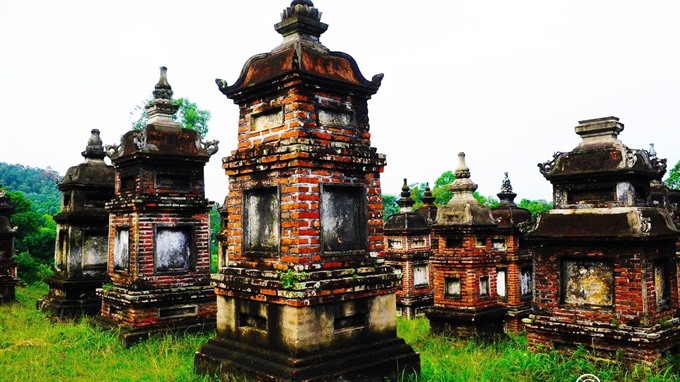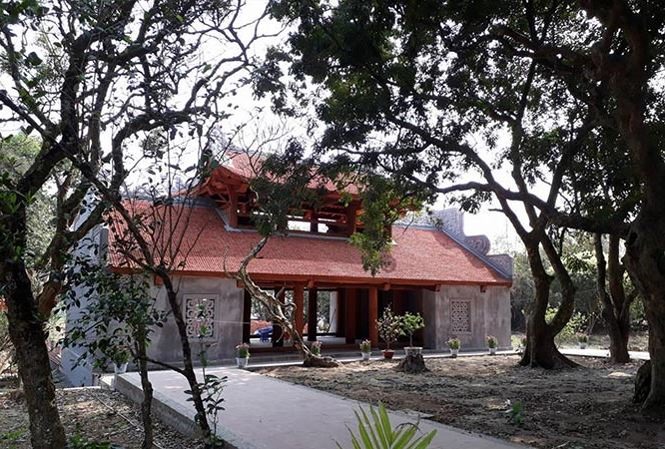 Life & Style
Life & Style

The Ministry of Culture, Sports and Tourism has just sent an official letter to the local authorities of Bắc Giang Province, asking them to halt the ongoing construction of a new gatehouse at a local pagoda, due its being a National Special Relic Site.
 |
| Heritage: The garden of nearly 100 towers outsite the pagoda, which is considered to be the biggest and most beautiful in Việt Nam. — File Photo |
HÀ NỘI — The Ministry of Culture, Sports and Tourism has sent an official letter to the local authorities of Bắc Giang Province, demanding that they halt the ongoing construction of a new gatehouse at a local pagoda, due its being a National Special Relic Site.
The gatehouse is being built at Bổ Đà Pagoda in Việt Yên District. The pagoda hosts a unique collection of wooden printing blocks, which are inscribed with the teachings of Buddhism, as well as a garden of towers.
The ministry allowed the pagoda to build a three-arched-entrance containing three rooms and two adjacent smaller rooms on either side. This follows the traditional architectural style of pagodas. Problems arose when it became apparent that the new gatehouse has five rooms, with two adjacent smaller rooms.
Culture Deputy Minister Đặng Thị Bích Liên has since signed a decree assigning concerned agencies in the province to stop the ongoing construction and seek solutions to solve the problem.
The ministry also asked local authorities to examine which agencies were responsible for allowing the illegal construction to go ahead, adding that those agencies will be dealt with according to the law.
Last year, Deputy Prime Minister Vũ Đức Đam assigned the Bắc Giang People’s Committee to make a master plan to preserve and develop the National Relic Site.
The Ministry of Culture was then assigned to co-ordinate with other concerned agencies to approve the plan, which contained building a new gate.
According to Venerable Monk Thích Thanh Vinh, head of Bổ Đà Pagoda, the site has never had a gatehouse like other pagodas.
“A long time ago, there was a gatehouse made from clay and wood,” he said, “Over time, the gate was weathered and eventually destroyed.”
Researcher Nguyễn Hồng Kiên voiced complaints in the Đất Việt (Việt Land) online newspaper. He pointed out that the pagoda hasn’t had a gatehouse for several hundred years, and questioned the reasoning behind why it should have one now. He said that there are many pagodas without three-arched-entrance gates.
“That’s a unique feature of those pagodas,” he said, “Bổ Đà Pagoda is a National Special Relic Site, new construction shouldn’t be added to it.”
Kiên suggested organising a workshop on the relic site to avoid similar violations taking place in the future.
 |
| In with the new: A new gate has been built at Bổ Đà Pagoda, a National Special Relic Site. —Photo tienphong.vn |
Artist Trương Đức Hải agreed that the relic site ought to be left as it is.
“In front of each section of the pagoda, there should be a clear space for visitors to enjoy it, especially with regard to historic architecture,” said Hải.
“We can not just build new architecture at relic sites when we like,” he said, “Because it may harm the general architecture of the site. Let alone the fact that the new construction may not suit the original architecture in terms of form, colour and style.”
A section of clay wall surrounding the pagoda was destroyed to give way to the newly built gate.
Bổ Đà Pagoda was built in the 11th century under the Lý Dynasty, during the golden age of Buddhism in Việt Nam, but was badly damaged during wars in the subsequent centuries.
It was not until the revival of the Lê Dynasty under King Lê Dụ Tông (1705-28) that the pagoda was reconstructed. It has more or less retained its shape up until today.
Because of the massive influence of Lâm Tế Buddhism, most of the pagoda’s famous carved woodblocks bear the Sutras of Zen Buddhism.
In the 18th century, the monks at the pagoda carved Buddhist Sutras on wood to print the texts so that they could be used to preach the philosophy. More than 2,000 woodblocks containing the Sutras are arranged on eight bookcases.
The woodblocks are 44cm long, 22cm wide and 2.5cm thick. Some are larger, measuring 150cm long, 30cm wide and 2.5cm thick. If all the Sutra woodblocks were laid side by side, they would cover an area of 250sq.m.
All the blocks were carved on thị wood (decandrous perssimmon), which is both light and pliable — perfect for carving and moving — as well as durable. To this day, most are still well preserved. The woodblock collection was officially recognised as a national treasure earlier this year.
Outside of Bổ Đà Pagoda is an 8,000sq.m tower garden encircled by an old brick wall.
Most of the towers are 3-5m high and have three or four stories. Inside 97 of the towers are the ashes of more than 1,000 monks. These towers, inscribed with the dates of birth and death of the monks, are a valuable source for researchers of Lâm Tế Buddhism.
With its many tower tombs, Bổ Đà’s tower garden is considered to be the biggest and most beautiful in Việt Nam. — VNS




